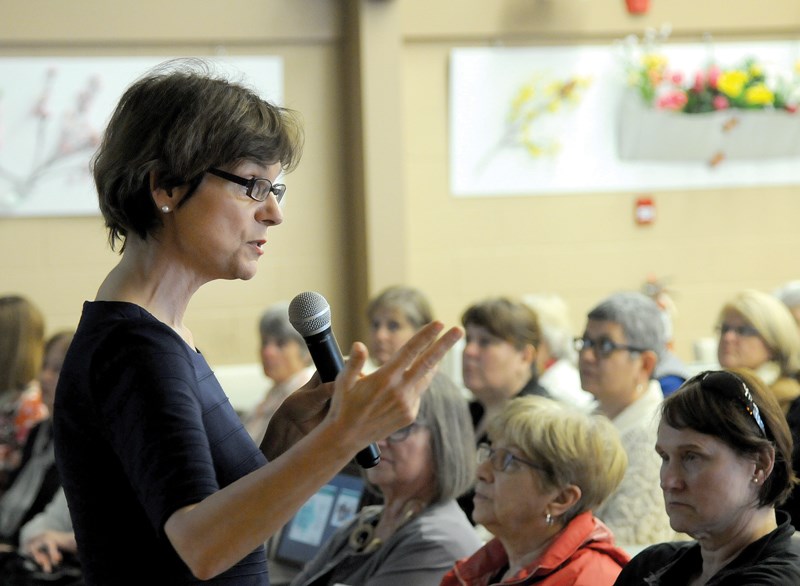Prepare to live a long life, most of it independently, but you could expect to lose your driver’s licence after age 85.
So says the B.C. Seniors Advocate, Isobel Mackenzie. At a meeting held May 16 at Silver Harbour Seniors Activity Centre, Mackenzie provided a group of seniors, seniors service providers, and other interested people, with a snapshot of the state of affairs for seniors in British Columbia.
Participants at the meeting, hosted by the Services to Seniors Coalition, wanted to know what the Seniors Advocate Office has been up to in recent months.
The office monitors the provision of services, analyzes systemic issues, provides information and referrals to seniors and their families, and (most importantly) reports to the minister and to the public on issues affecting seniors, and provides recommendations to the minister and other service providers.
Mackenzie talked about who seniors are and what they want, stereotypes of seniors, common misperceptions about seniors and the reality of seniors living in B.C.
The so-called “silver tsunami” is a myth, said Mackenzie. She implied that while the proportion of seniors in the general population is rising, this is not a sudden wave crashing over us swamping health-care resources and requiring disaster relief from government treasuries. Rather, it is a long-predicted and steady growth that impacts on and requires planning for issues such as health care, home support, and residential care. The challenges are not disproportionate. For example, only 22 per cent of people accessing hospital emergency departments were over 65.
Using seniors as a general term often implies that seniors are a homogenous group with no differences and stereotypes them in a negative way, said Mackenzie. In their younger years, a senior could have been a stay-at-home mom or a hippie. Though they may look similar now, seniors continue to maintain their differences with their own aspirations, values and hopes as do young people.
Mackenzie talked about the general population of seniors using several indicators, such as percentage of population and its projected growth. At this point in time, she said, there are 850,000 seniors in B.C., which is 18 per cent of the population and it is projected to grow to 24 per cent by 2031.
Mackenzie indicated statistics on median income ($26,800 for those over 65), numbers of seniors living independently (a startling 94 per cent over 65 and 74 per cent over 85), the number of seniors still driving, and how many seniors are living without a diagnosis of dementia (94 per cent over 65 and 80 per cent over 85). This last statistic dispels some people’s perception that the rates of dementia are quite high in the seniors population.
The life expectancy of a B.C. senior compared to the U.S., Sweden, U.K. and Canada overall was a few years higher. It seems B.C. is a good place to live, despite the rain.
Mackenzie also talked about what her office has heard from seniors about their concerns. These include living independently, diminishing incomes, poor transportation alternatives, inconsistent home-care services, devaluation of seniors by an ageist society, how seniors lack respect in making their own decisions, and a fragmented care system overall.
The seniors advocates office has worked on several issues to date including housing, caregivers, residential care and home support, and transportation.
In relation to housing, Mackenzie reported that while rents have gone up 34 per cent, rent subsidies went up by only nine per cent. There are long wait lists for subsidized housing, and more units are needed, particularly in rural and remote areas. A positive thing, said Mackenzie, is that many people are deferring their property taxes, leaving them money for essentials.
She went on to point out that the situation for caregivers is not encouraging, as 29 per cent of caregivers are in distress, one of the highest rates in Canada.
Despite a new $500 million for more hours in residential care, 91 per cent of facilities are not meeting provincial standards. Home support services are not adequate, not flexible enough, and the cost is a barrier to many seniors.
Mackenzie is an engaging speaker, well worth your time if you have a chance to hear her. The presentation will be available online at lionsviewseniorsplanning.com. As well, the seniors advocates office has many resources online and by phone. To reach them online go to seniorsadvocatebc.ca or phone 1-877-952-3181.
Margaret Coates is the co-ordinator of Lionsview Seniors’ Planning Society. She has lived on the North Shore for 47 years and has worked for and with seniors for 20 of those years. Ideas for future columns are welcome. Send an email to: [email protected].



